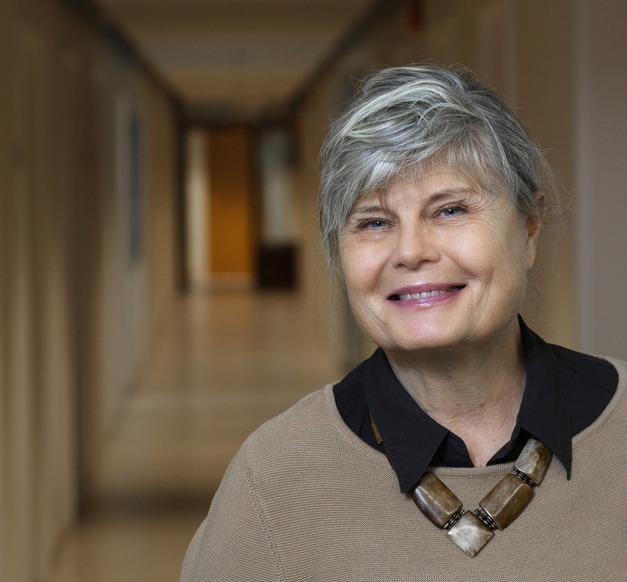
"As soon as young people have a good idea of what makes a positive sexual relationship, they are in a better position to prevent unwanted pregnancy and sexually transmitted diseases, because they know how to communicate. They have all the tools they need to enjoy sex," says Sóley Sesselja Bender, professor at the University of Iceland Faculty of Nursing and Midwifery and specialist in sexual health. Sóley has done pioneering work in sexual health policy in Iceland and internationally and has decades of experience developing sexual health education.
Sóley's work and research has focused on sexual health, in particular sex education for teenagers, sexual health services, teenage pregnancy and sexual behaviour in adolescence. "Ever since I was a Master's student, I have placed enormous emphasis on young people and the vast majority of my research and the projects I have supervised are related to young people. That's the main theme."
Sóley is now working on the project "Are you ready for sex? A sexual health handbook for young men", which is targeted at young men aged 16-24. Her partners on the project are two of her former Master's students: Katrín Hilmarsdóttir and Lóa Guðrún Gísladóttir. Together they have completed three studies into the sexual health of young men, which form the basis of this handbook. They were inspired to write it when, as part of Lóa Guðrún's research, the young men themselves reported that there was no handbook to guide them when it came to sex.
Girls more often in a position of responsibility
"I then started noticing how much responsibility is put on girls and their sexuality and gradually, as the years went by, I began to feel conflicted. I became more and more unhappy with the way we put girls in such a serious position of responsibility. Why should it always be the girls who have to negotiate condom use and why should they have to sort it out if any risks are taken?" asks Sóley.
She explains that the writing of the book is guided by questions like this, by the research of Katrín, Lóa Guðrún and herself, by other studies, and by the need for better educational material. "Our goal is to empower young men and help them realise that sexual relationships are based on interaction, communication, mutual respect and consideration. These are skills that need to be acquired," she says.
The book is then intended as a kind of guide for young men, giving them advice on how best to approach things in a healthy way. "Writing a book like this is tricky because it needs to send clear messages without preaching, because you'll never achieve anything by preaching."
"I then started noticing how much responsibility is put on girls and their sexuality and gradually, as the years went by, I began to feel conflicted. I became more and more unhappy with the way we put girls in such a serious position of responsibility. Why should it always be the girls who have to negotiate condom use and why should they have to sort it out if any risks are taken?" asks Sóley. Photo/unsplash.com

Published as an e-book
The book will be published as an e-book, making it easy to browse the different chapters. The authors tried to make it engaging, provide questions and answers, interactive exercises and quotations from young men who have taken part in their research "because these are their voices and we want to show our readers what their peers are that most people are doing really well, e.g. with condom use. Give them that insight to prove that they can achieve the same."
Sóley explains that it is challenging to capture the attention of readers and educate them at the same time. The content needs to be interesting.
"The book is structured around six main themes," says Sóley. The themes are self-confidence, relationships, consent, sexual activity, condoms and communication. The book is not yet complete, but
the idea is not necessarily that someone should read it from cover to cover, but rather dip into it and browse different sections, maybe more than once. This should help people who have trouble, as the authors have seen in their research, e.g. communicating, using condoms, and many other things.
Communication and remembering to enjoy yourself
"Our research has shown us that young men often find it hard to talk about things with sexual partners. If a girl doesn't say anything, young men sometimes assume somehow that she is taking the contraceptive pill, but maybe she isn't at all. She doesn't dare to say anything and he doesn't dare to say anything," says Sóley.
Sóley explains that the book should get across the message that sex is an umbrella term. Sex is not just sexual intercourse with another person; the umbrella also covers embracing, kissing, looking into each other's eyes, having fun together and learning about each other. Young people should understand that by taking your time and using a condom, sex can be more enjoyable. Sex education should be about more than just preventing pregnancy and STDs. It should also include aspects like communication and emotions.
Listening to the voices of young men
We have made good progress on the manuscript, but it needs to be completely finished before we take it to the next stage," says Sóley, adding that a group of young men will be asked to look at the manuscript and provide feedback on what does and doesn't work. The project is based on the voices of young men and their needs are prioritised. Sóley concludes: "We believe that this handbook will equip young men to safely enjoy sex with a sexual partner."
Author of the article: Apríl Auður Helgudóttir, MA student in Journalism


